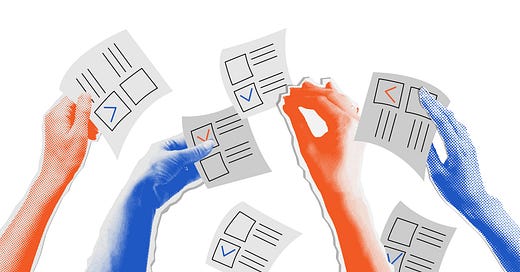Stressed Out About the Election?
Catastrophizing, ruminating, doomscrolling, and name-calling are not helping. Here are 10 things to do instead.
You don’t need a nationwide survey to tell you that politics is stressing people out but here it is anyway:
69% say the election is stressing them out
77% say that he future of the nation is a significant source of stress in their lives
54% say they have very little or not trust in the government
41% of adults reported the state of the nation has made them consider moving to a different country (Portugal is looking really appealing…just saying)
50% said tension around social and political topics makes them less likely to want to connect with other people
28% said they have nothing in common with people who have different political opinions than they do
(Source: The Harris Poll on behalf of the APA)
Doomscrolling, catastrophizing, ruminating, and name-calling are not helping. Here are 10 strategies to help you keep calm and carry on:
1. Recognize what you can and can't control
Focus your time and energy on domains where you have agency like your actions and behaviors. No matter how many times you check the polls, you will not have a definitive answer. If we have learned anything from the past few election cycles it’s that those pundits are clueless so don’t waste time listening to predictions. Political engagement is healthy. Doomscrolling is not.
2. Be the change
Embrace learning mode and action mode, not hate mode. Outrage fuels a cycle of negativity, anxiety, and hopelessness. Instead of throwing your hands up in the air with frustration or fury, ask yourself, "What can I learn from this?" Along these lines, be informed. Don't rely on soundbites and social media. Seek reliable sources like Jessica Yellin.
3. Get local
While all the attention is on the candidates at the top of the ballot, educate yourself about the down-ballot races as well. Learn about the proposals. Engaging in what is going on in your neighborhood matters and will help you feel more connected to those around you.
4. Focus on the future
There is no benefit in repeating the phrase “if only…” and wallowing in your emotions. For your friends, for your family, for your country, be a force that keeps us moving in a positive direction. Every year, two years and four years, you have the constitutional privilege to vote again. If things don’t turn out the way you hope for, ask yourself, “moving forward, what can I do?” Plus, political engagement includes activities beyond voting such as volunteering, organizing rallies and running for office.
5. Take care of yourself
Inhaling a tub of ice cream, drinking tequila, and staying up late may numb the pain in the moment but erode your resilience reserves. Put your phone away, prioritize sleep, eat well, and move your body. Staying active repurposes nervous energy as productive energy.
6. Agree to disagree
Disagreements don't have to end discussions or friendships. Conversations with those who hold opposing views can be constructive and even lead to a new and more expansive way of understanding an issue. Who knows? You might learn something in the process. As I always say, argue as though you are right but listen as though you are wrong. Productive conflict starts with honest, open listening. How receptive are you to hearing from the other side? Take the quiz here.
7. Don’t try to change someone else’s mind
Pushing your perspective won't help. Nor will snowballing them with data, emotional pleas, or contempt. Help the person find their own motivation to learn more and perhaps think differently. Behavioral scientist Katy Milkman suggests asking the simple question, “how does that work exactly?” when someone tells you their candidate’s policy about an issue is superior. Most people assume they know more about a topic than they actually do, so asking them to explain the policy in depth typically invites reflection, curiosity, and hopefully some humility.
8. Change the subject
There are so many other things to talk about besides politics. The weather? Books? (I am loving Kingmaker: Pamela Harriman’s Astonishing Life of Power, Seduction and Intrigue) The northern lights? Get creative. Sometimes small talk is just what the doctor ordered. To rise above the moment, we need to find common ground. Choose topics of conversation anyone can relate to.
9. Distract Yourself
If dread is getting the better of you, choose an absorbing diversion—cooking, going for a walk, listening to music, or meditating—to help you block out election anxiety and that distracts you from your triggers. To disrupt the anxiety loop: Identify the trigger such as watching polarizing news which leads to a counterproductive behavior such as doomscrolling or debating online, which results in even more anxiety. Apologies to Freud but sometimes sweeping unwanted thoughts under the rug can help us feel a little better and get on with our day.
10. Be realistically optimistic
When we catastrophize, we fixate on the worst possible outcome and treat it as likely, even when it is not. Overestimating the probability of a negative situation fuels irrational worry and turns a minor setback into a definitive dead-end. The result is hopelessness, frustration, and avoidance. The ultimate result of catastrophizing is missing out on opportunities and experiences that bring us joy and meaning. Even if your candidate loses, you don’t have to lose your mind.
To counteract this doomsday mindset, Martin Seligman, the founder of Positive Psychology, suggests a simple exercise called “Put it in Perspective.” As soon as negative spiraling kicks in:
Step 1: Play out the worst-case scenario
Step 2: Play out the best-case scenario
Step 3: Consider what’s most likely to happen
Between the two extremes, you’re more likely to find the most realistic outcome.
As this exercise helps us understand, it is not the incident itself but the negative interpretation of the incident that leads to catastrophic thinking and the subsequent snowballing of negative emotions.
If there was ever a moment to be the best version of yourself it is now.
As the Foo Fighters remind us:
It's times like these you learn to live again
It's times like these you give and give again
It's times like these you learn to love again
It's times like these time and time again
For more tips…
I was delighted to join Men’s Health Editor-in-Chief Rich Dorment and Calm’s Dr. Chris Mosunic to discuss ways we can all manage stress during election season. You can watch our full conversation here:






This is great advice. I'm going to follow this, share it, and keep it for the rest of my life! Thank you, Dr. Boardman!
Thank you. Great advice, as always, during a particularly challenging time.